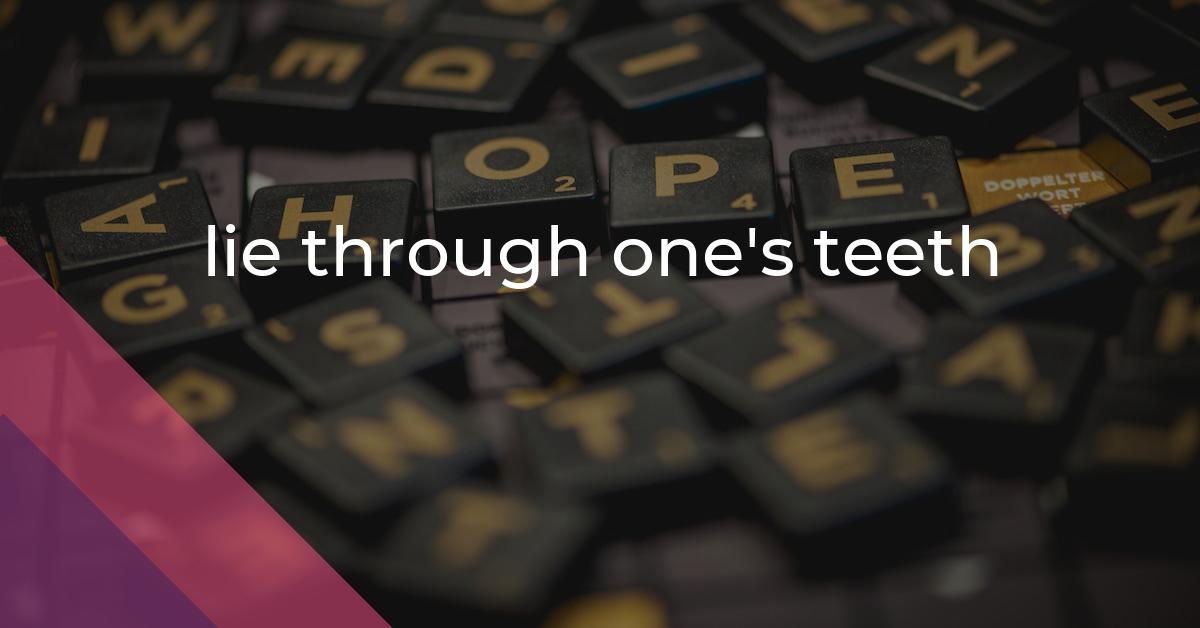lie through one’s teeth: Idiom Meaning and Origin
What does ‘lie through one's teeth’ mean?
The idiom "lie through one's teeth" means to tell blatant and deliberate lies, often with great confidence. The phrase implies that the person is speaking untruths without hesitation or remorse.

Idiom Explorer
The idiomatic expression "talk through one's hat" means to say something without knowledge or authority, often resulting in falsehoods or nonsense.
The idiom "put one over" means to deceive or trick someone in a clever or sneaky way.
The idiom "one's heart in one's mouth" means to be extremely anxious or fearful.
The idiom "mouth the words" means to silently or mimically articulate words without actually saying them out loud. It commonly refers to situations where someone is pretending to speak or is unable to vocalize their thoughts.
This idiom means to exaggerate or make something seem more serious or important than it really is.
The idiom "live a lie" means to lead a life that is built on deception or falsehood, pretending to be someone or something that one is not.
The idiom "lie in one's throat" means to knowingly tell a falsehood or make a false claim, despite it being obvious to others that it is not true.
"Lie ill in one's mouth" means that something, usually food or drink, tastes unpleasant or causes discomfort when consumed.
The idiom "lie before" means to be faced with a decision, challenge, or opportunity.
The idiom "lie back and think of England" means to endure something unpleasant or uncomfortable for the greater good or out of a sense of duty.
Deceptive Tales
Originating from the 16th century, the idiom "lie through one's teeth" is a widely used expression that means to tell a deliberate and outright falsehood. When someone lies through their teeth, they do so without hesitation or guilt, often with convincing confidence.
The phrase "lie through one's teeth" emerged from the imagery of using teeth to speak falsehoods. Teeth, which are associated with honesty and integrity, hold symbolic significance. By using this idiom, speakers emphasize the audacity of the deceit being perpetrated. It emphasizes the sheer boldness of the lie.
One might also see the phrase as reflecting a human instinct to associate credibility with physical attributes. Trusting someone based on their physical appearance is a long-standing idea seen in many expressions across languages.
Furthermore, "lie through one's teeth" conveys a sense of defiance and audacity. The image it creates of someone brazenly spreading falsehoods leaves an impression of a person who is deceitful to the core. This expression resonates due to its vivid nature and the recognition that convincing lies can be destructive.
It's important to note that "lie through one's teeth" is distinct from related idioms such as "lie like a rug" or "lie through one's nose." While all these variations convey falsehood, their nuances and origins differ. "Lie through one's teeth" specifically conveys deliberate and direct deceit.
Another related idiom is "lie in one's throat." This phrase refers to someone stating a lie so blatantly that it is evident to anyone listening. Unlike "lie through one's teeth," which emphasizes the act of telling falsehoods with confidence, "lie in one's throat" focuses on the obviousness of the lie.
Similarly, the idiom "live a lie" is related to "lie through one's teeth." It describes a situation where someone pretends to be someone they're not, maintaining a facade that conceals their true selves. The act of living a lie relies on continuous falsehood, akin to lying through one's teeth.
"talk through one's hat" is another idiom related to the concept of deceit. It means to talk excessively or confidently about something without having accurate knowledge or understanding. Although the literal meaning is different from "lie through one's teeth," both idioms involve misleading communication.
"give the lie" is yet another related idiom, suggesting the act of contradicting or disproving a lie. When someone gives the lie, they expose falsehoods and present evidence or facts that undermine the deceit. This idiom demonstrates the power of revealing the truth and challenging dishonesty.
The idiom "lie through one's teeth" illustrates the complexity of deception. Its inclusion in everyday language emphasizes the universal recognition of lying as a common human behavior. As we contemplate the implications of dishonesty, this idiom serves as a reminder of the fragile nature of trust. While it doesn't refer to any specific historical events or individuals, it stands as a testament to the enduring struggle between truth and falsehood.
Example usage
Examples of how the idiom lie through one's teeth can be used in a sentence:
- She lied through her teeth when asked if she had eaten the last piece of cake.
- The politician lied through his teeth about his involvement in the scandal.
- Despite the evidence against him, he lied through his teeth during the trial.
More "Deception" idioms



